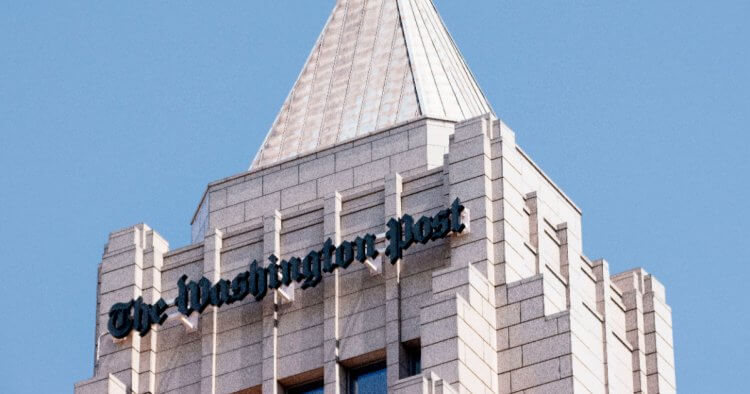The legal representatives of the social media platform owned by former President Donald Trump have initiated a defamation lawsuit against The Washington Post.
According to a report from The Tennessee Star, the lawsuit by Trump Media and Technology Group was filed on Saturday in a state court located in Sarasota County, Florida, and it aims to obtain damages amounting to $3.78 billion.
Additionally, The Epoch Times has provided additional coverage on the matter.
The suit alleges that the Washington Post article titled “Trust linked to porn-friendly bank could gain a stake in Trump’s Truth Social” includes a series of “materially false” statements that accused the Trump-owned company of fraud and other wrongdoing.
“WaPo’s false criminal charges exposed TMTG to public ridicule, contempt and distrust, and injured TMTG’s business and reputation,” the complaint states, while accusing The Washington Post of waging a years-long crusade against the Truth Social owner.
The complaint further states that “WaPo’s latest defamation creates an existential threat for TMTG, causing enormous loss.”
The Washington Post did not immediately respond to a request for comment on the lawsuit.
The lawsuit alleges that The Washington Post made a number of false statements about TMTG in the May 13 article that the paper spread to its 2.5 million subscribers and then in follow-on social media republications.
The nine allegedly false claims, as listed in the complaint, are as follows:
“An obscure financial entity … would gain a sizable stake in former president Donald Trump’s media company if its merger deal proceeds”;
“[T]he role ES Family Trust would assume in Trump Media and Technology Group has never been officially disclosed to the Securities and Exchange Commission [“SEC”] or to shareholders in Digital World Acquisition [“DWAC”], the special purpose acquisition company, or SPAC, that has proposed merging with Trump’s company”;
“The companies also have not disclosed to shareholders or the SEC that Trump Media paid a $240,000 finder’s fee for helping to arrange the $8 million loan deal with ES Family Trust”;
“…the recipient of that fee was an outside brokerage associated with Patrick Orlando, then Digital World’s CEO”;
“Orlando’s finder’s fee could affect the value of the shares”;
“Trump’s media company took out an $8 million loan in exchange for stock, but no one told the SEC”;
“Trump Media: this time they borrowed money from a bank best known for servicing the adult entertainment, pledged a stake in the company for the loan and didn’t tell the SEC”;
“A Russian banker connected to the porn industry could have gained a stake in Trump’s Truth Social according to documents”;
“The Guardian reported in March that federal prosecutors in New York have been investigating whether the Trump Media loans violated money laundering statutes.”
The complaint disputes the veracity of the statements, alleging that they are “materially false” and that they “immediately conveyed a defamatory meaning to readers” in the form of suggesting that TMTG committed securities fraud, that it took part in “improper acts designed to conceal material facts” from DWAC shareholders and the SEC, and that TMGT was under investigation for money laundering.
“The WaPo statements impute to TMTG crimes, dishonesty, want of integrity and corporate malfeasance,” the complaint states.
The lawsuit further alleges that WaPo was “not content” with spreading the statements to its 2.5 million subscribers and to its 20 million Twitter followers.
“In order to further spread the smear and increase the damage to TMTG, WaPo engaged agents from both within and outside the company to broadly republish the defamation,” the complaint alleges, listing various instances of the article being posted and reposted on social media.
“WaPo’s republication frenzy and repeated concerted harassment evidences a knowing, deliberate, organized and systemic effort to promote the false and defamatory Statements worldwide in order to inflict the greatest possible injury” to Trump’s company, the suit alleges.
Truth Social was launched last year as an alternative to social media platforms Twitter and Facebook. It caters to conservatives, many of whom have said they have experienced discrimination on mainstream platforms.
 Telegram is where we really talk. Don't miss out!
Telegram is where we really talk. Don't miss out!






